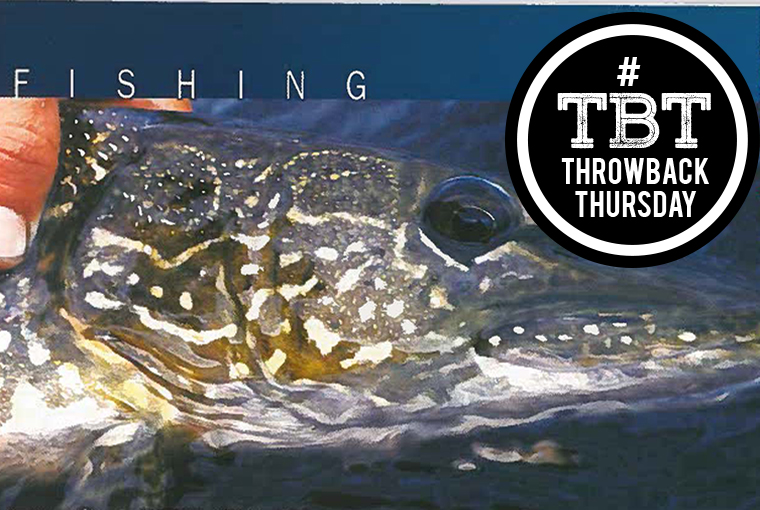
Several years ago I did a radio interview with a morning show host I’d never spoken with before. The subject was to be kids and fishing and the promotion of National Fishing Week. The host, a woman from Toronto who seemed not especially thrilled with the topic, decided to sandbag yours truly live on air.
“How do you condone teaching kids to hurt fish?” she said, after I discussed why I take my children fishing. The question wasn’t on the script. I explained fish differ from humans and, if handled correctly, can recover quickly from being caught and released.
Not a bad answer, I thought.
“Are you saying these fish are not feeling pain when you catch them?” she shot back.
I had to admit I didn’t know for sure, but was confident the experience was different from what humans felt. In retrospect, my answer was presumptuous and probably sounded a little hollow. To be honest, fish pain was something I’d not considered much. Since then I’ve spent a fair bit of time thinking about it and my responsibility as an angler.
Do fish feel pain when we catch them?
Do fish feel pain when we catch them? And if they do, what possible reason could there be to continue angling – and especially releasing – fish for pleasure?
The topic made news around the globe this year and was seized upon by several animal-rights groups. They say hooking a fish is the same as hooking a mammal or human. They believe, as Lord Byron once wrote, that angling is “the cruelest, the coldest, and the stupidest of pretended sports.”
In England several cases of terrorism were aimed at the angling community. In the United States protests have been less violent, but a few bass tournaments have been the scenes of small, but noisy, anti-angling events.
For a real eye-opener check out the People for Ethical Treatment of Animals (PETA) anti-fishing Web site, www.fishinghurts.com. It says angling hurts fish, and people who do it are misinformed, at best, barbaric at worst. It wants everyone to stop eating fish and become vegetarians.
For the most part, PETA’s arguments are based on emotion. The group’s most direct evidence of fish feeling pain comes from a 1979 paper sponsored by the Royal Society for the Prevention of Cruelty to Animals, which reached this conclusion:
“The evidence suggests that all vertebrates (including fish), through the mediation of similar neuoropharmacological processes, experience similar sensations to a greater or lesser degree in response to noxious stimuli.”
By most accounts, the study doesn’t hold up well to close scientific scrutiny.
Academic debates
The controversy over fish pain is not restricted to the fringe of the animal-rights world. Within the academic community, the welfare of animals and fish used in research has been hotly debated.
The most recent research specifically on whether fish feel pain was undertaken by a professor of zoology and physiology at the University of Wyoming, Dr.James Rose. He has spent 30 years researching brain function, including the reaction to pain, and has done extensive work with fish and other animals.
The American Fisheries Society — a scientific organization of biologists, scientists, fisheries managers, and fish-culture experts — asked Rose to undertake the study. It wanted to address the ethics and regulation of using fish in research, specifically what the proper criteria should be for guaranteeing the humane treatment of fish.
To get a comprehensive sense of the issue, Rose and his colleagues did a massive literature survey on all available research that dealt not only with pain, but with the neurology of fish and other species. Rose compiled a huge body of information never before examined for this specific purpose. Rose and his colleagues learned that a lot is known about the neurology of pain and what it takes to experience it.
It’s generally agreed upon among scientists who study pain that the actual experience of pain is a psychological thing and that it’s completely separate from the behavioural reactions,” Rose said.
Consciousness key to pain
“Pain is predicted on awareness,” he continued. “The key issue is the distinction between nociception and pain. A person who is anaesthetized in an operating room, or has had a bad head injury, will respond physically to external stimulation, but he or she will not feel pain. Anyone who has seen a chicken with its head cut off will know that, while its body can respond to stimuli, it cannot be feeling pain.
“The term ‘nociception’ refers to the detection of noxious stimuli by the nervous system. The peripheral nervous receptors scientists call nociceptors sense stimulation and report to the central nervous system, where motor responses are initiated and the sensation of pain is perceived. Some fish species certainly do have nociceptive neurones similar to those found in a human. However, this means only that these animals are capable of sensing noxious stimuli; it provides no evidence for the psychological experience of pain.”
The Rose study concluded the conscious experience of pain or suffering is due to activity in the cortex of the brain. That activity is located in a specialized kind of cortex called the neocortex, which is very large in humans. Fish don’t possess a neocortex. They literally don’t have the brain system to feel pain or other emotions like fear.
“There are pretty big differences in the way nervous systems work in different animals,” said Rose. “The research shows that our experiences as humans are really unique as a species and it’s really wrong to generalize that our experience is the same as other animals.’ If we really want to understand the true nature of other animals, we have to resist taking a human-centred (anthropomorphic) perspective of them.”
Research rebuttal
Scientists around the globe widely accepted this groundbreaking study on fish pain, but, as you might expect, there has not been universal acceptance of Dr. Rose’s conclusions.
This April, just months after Rose released his study results, the world media reported that scientists in Scotland had proven that fish actually do feel pain after all. The study at Edinburgh University and the Roslin Institute (also the birthplace of Dolly the cloned sheep) was done on captive rainbow trout. The researchers, led by Dr. Lynne Sneddon, applied mechanical, thermal, and chemical stimuli to the heads of anaesthetized fish and recorded the neural activity.
She reported finding 58 receptors located on the face and head of the trout that responded to at least one type of stimuli. Of these, Sneddon said 22 could be classified as nociceptors, in that the fish responded to mechanical pressure when heated above 104 degrees Fahrenheit (40 degrees celsius).
As Dr. Rose reported, the mere presence of nociception in an animal is not enough to prove that it feels pain, because its reaction may be a reflex.
So, the Scottish researchers injected massive amounts of poison (bee venom or acetic acid) into the lips of some of the trout, with control groups receiving saline-solution injections or simply being handled. All the fish had been conditioned to feed at a ring in the holding tank, where they were collected for handling or injection.
Their reactions were then recorded.
Behaviours vs responses
Dr. Sneddon noted that trout subjected to bee venom and acetic acid exhibited “anomalous behaviour.” Fish demonstrated a “rocking” motion, similar to the kind seen in stressed higher vertebrates, like mammals. “The trout injected with the acid were also observed to rub their lips onto the gravel in their tank and on the tank walls,” Sneddon said in an interview with the United Kingdom press.
“These do not appear to be reflex responses.”
The fish injected with venom and acid also took almost three times longer to resume feeding than the control groups. Dr. Sneddon said his team’s work “fulfills the criteria for animal pain.”
The UK’s National Angling Alliance was quick to react to the Scottish study. Dr. Bruno Broughton, a fish biologist and NAA advisor, said, “I doubt that it will come as much o a shock to anglers to learn that fish have an elaborate system of sensory cells around their mouths…However, it is an entirely different matter to draw conclusions about the ability of fish to feel pain, a psychological experience for which they — literally — do not have the brains.”
PETA, not surprisingly, welcomed the Scottish study, but said fish shouldn’t have had to suffer to prove something “they feel is obvious.”
It should be noted Dr. Rose doesn’t dispute fish have sensory cells in and around the mouth. He believes, however, the Scottish study is seriously flawed. PETA has pressured Rose to retract his findings, but he stands by his original results.
While debate is sure to rage on about fish pain, it seems clear to me that what a fish experiences when impaled on a hook cannot be compared to what a human will feel. Bee-stung trout lips do not hold much weight against the massive scientific-literature search and review undertaken by Dr. Rose.
Drive to survive
Do fish respond to hook? Of course. The reaction of a trout to a fly, a walleye to a jig, or a muskie to a bucktail is what’s drawn anglers to the water since recorded time. The fight of a fish is a large part of the thrill of angling. The instinct to escape capture is hard-wired into fish. They don’t need to feel pain to struggle against a hook and line pulling in the opposite direction.
Survival, not pain, drives them.
It’s the same flight response a fish would exhibit to a visible predator or being startled by a vibration in the water, the Rose study pointed out.
Knowing fish don’t feel pain in no way absolves anglers from acting responsibly. Just the opposite is true. Anglers who practise catch-and-release need to be especially mindful how they handle live fish. They can be stressed physiologically when out of the water, and stress can quickly become lethal.
All fish should be treated with respect when caught, whether they’re to be killed or released. A fish that is to be eaten should be dispatched humanely as soon as possible. We must always be mindful of our stewardship duty to protect and conserve fisheries.
It comes along with the privilege of fishing.

Originally published in the October-November 2003 issue of Ontario OUT of DOORS.
Gord Ellis is a Senior Editor, journalist, radio broadcaster, photographer, and professional angler based in Thunder Bay.
Reach Gord at: mail@oodmag.com and @GordEllis on Twitter.
To learn more about fish and pain, click here
